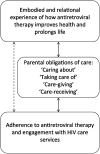Parental obligations, care and HIV treatment: How care for others motivates self-care in Zimbabwe
- PMID: 30027764
- PMCID: PMC7583436
- DOI: 10.1177/1359105318788692
Parental obligations, care and HIV treatment: How care for others motivates self-care in Zimbabwe
Abstract
This article examines how parental obligations of care intersect with HIV treatment-seeking behaviours and retention. It draws on qualitative data from eastern Zimbabwe, produced from 65 interviews. Drawing on theories of practice and care ethics, our analysis revealed that norms of parental obligation and care acted as key motivators for ongoing engagement with HIV services and treatment. Parents' attentiveness to the future needs of their children (caring about), and sense of obligation (taking care of) and improved ability to care (caregiving) following treatment initiation, emerged as central to understanding their drive for self-care and engagement with HIV services.
Keywords: HIV; Zimbabwe; antiretroviral therapy; care; family; obligation.
Conflict of interest statement
Figures
References
-
- Abioye A, Soipe A, Salako A, et al. (2015) Are there differences in disease progression and mortality among male and female HIV patients on antiretroviral therapy? A meta-analysis of observational cohorts. AIDS Care 27: 1468–1486. - PubMed
-
- Ankrah EM. (1993) The impact of HIV/AIDS on the family and other significant relationships: The African clan revisited. AIDS Care 5: 5–22. - PubMed
-
- Attride-Stirling J. (2001) Thematic networks: An analytic tool for qualitative research. Qualitative Research 1: 385–405.
-
- Blue S, Shove E, Carmona C, et al. (2016) Theories of practice and public health: Understanding (un) healthy practices. Critical Public Health 26: 36–50.
Publication types
MeSH terms
Grants and funding
LinkOut - more resources
Full Text Sources
Other Literature Sources
Medical


